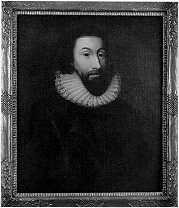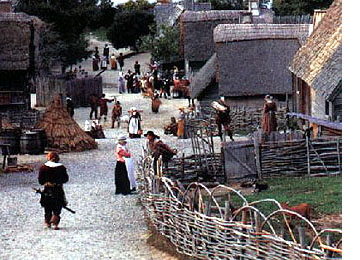Winthrop a Model of Christian Charity Summary
Winthrop a Model of Christian Charity Summary
Summary of John Winthrop'due south
"Model of Christian Charity"
 John Winthrop'due south Model of Christian Charity - delivered on board the Arbella as members of the Massachusetts Bay Colony sailed toward the New Globe - describes the struggle of Puritans and their "errand into the wilderness." Their struggle? How can a group of outcasts who take a addiction of quarreling with authority construct a strong society without fighting amongst themselves? As we will observe, public life in the Puritan era depended upon the manner through which contradictions in a "customs of perills" are sustained through the utilize of the American Jeremiad.
John Winthrop'due south Model of Christian Charity - delivered on board the Arbella as members of the Massachusetts Bay Colony sailed toward the New Globe - describes the struggle of Puritans and their "errand into the wilderness." Their struggle? How can a group of outcasts who take a addiction of quarreling with authority construct a strong society without fighting amongst themselves? As we will observe, public life in the Puritan era depended upon the manner through which contradictions in a "customs of perills" are sustained through the utilize of the American Jeremiad. Winthrop'south sermon makes for difficult reading, but it's worth the effort. As Sacvan Bercovitch writes, "Winthrop's address comes down to united states every bit a cultural artifact, an integral office of our national legacy, and the city it envisions at its climax is a fundamental to the social-symbolic game through which the Us has perpetuated itself as America" (northward.p.). [only see Maria Russo's dissenting view.] Following a brief background discussion of John Winthrop, I will outline three paradoxes illustrated by the sermon to sustain Puritan public life: (1) a trunk politic must maintain departure amid its members to ensure community, (2) worldly activities such equally the acquisition of money can serve spiritual ends, and (3) stable public life depends upon some exterior threat to its existence.
Background
John Winthrop (1588-1649) was governor of the Massachusetts Bay Colony - a grouping of entrepreneurs who left Europe in search of merchandise opportunities in the New Earth. Like most members of the Colony, Winthrop was a Puritan. This grouping claimed that the Church of England was corrupted by selfish leaders and petty squabbles. In contrast, Puritans envisioned an idealized community in which all citizens would focus their lives on the word of God. Ironically, the Puritans' almost single-minded pursuit of a perfected society based on biblical teachings resulted in impressive success in secular affairs. This success is often explained by the so-called "Puritan Piece of work Ethic" - the power to sacrifice personal ambitions for larger goals. Puritans as well believed that they could be a blest people - chosen past God to set an example for others. As a corollary, they preached that God's wrath would fall swiftly upon a people who strayed from His divine path. In this case, Puritan order must be unified - public life and all its manifestations must act as a unmarried individual seeking God. This religious approach is quite unlike than the i described past More's Utopia, marked by its religious tolerance. As yous read the sermon and this summary textile, consider the rhetorical strategies employed to construct a community in which oppositional forces - individualism and community - must be counterbalanced.
Difference within the Body Politic
Winthrop'south sermon begins with a seemingly innocuous question: why are some people rich while others are poor? Many readers assume that the Puritans were simply another grouping of rich white men trying to class a powerful central government. However, some respondents propose that theirs was a radical notion of public life where faith, not social ranking, could unify an entire people. As usual, ane should think that even the Puritans made a habit of dispatching individuals who, despite their faith, challenged the new state. Similarly, the presence of servants among the mostly well-to-practice Puritans indicates some distinction among persons, even in this idealized customs. Winthrop states that difference amidst people (wealth being merely 1 unit of distinction) is ordained by God for three reasons.
- Diversity amongst people allows for a variety of ways in which God may be honored.
- Acts of kindness by the rich toward the poor - and a spirit of obedience past the poor toward the rich - farther manifest the spirit of platonic public life.
- Common demand among individuals with different qualities - shared struggles from different stations in life - is necessary to society.

Wealth in a spiritual society
The role of the individual in relation to the state continues to guide Winthrop's sermon every bit he anticipates another problem: what is the extent of our duty to others, both inside and beyond our community? Do we have a spiritual obligation to serve the poor - fifty-fifty if that results in our becoming poor? Certainly, he sympathizes with the objection that one must get-go serve the needs of 1'due south family earlier helping others. In this fashion (and in many others), Winthrop offers a different philosophy than Plato who, in book five of the Democracy, displaces the family from his communist public life. Ultimately, even so, Winthrop concludes that excessive wealth leads our hearts abroad from God and toward the sin of pride and its social ramification, disregard for social needs.
Is wealth, therefore, a bad matter? Certainly not, co-ordinate to Winthrop. He has already established that some wealth tin can reflect the celebrity of God and that it should be maintained to help ane'southward family unit. He also expands the role of wealth to its potential use for the good of the religious state: "the Lord lookes that when hee is pleased to call for his correct in any thing wee haue, our owne involvement we haue, must stand up aside till his turne be served" (p. 2). Finally, he concludes, that one must share one'south wealth with others - fifty-fifty if they cannot repay their debts to you. Note the paradox: a religious community seeking wealth in the New World must justify its actions somehow. If a person's individual wealth is redefined equally part of a symbolic storehouse for the common expert, and so personal profit might be adequate in the Puritan society. Public life must therefore be potent to accommodate and justify the original motives that led many to the New World.
This public life rests upon an interesting human relationship between wealth and love. Members of the Puritan guild must love ane some other, turn to each other, and be willing to give freely of their gathered riches. This love is not manifested past ideals alone; mere warm feelings are non enough. One must manifest love toward community through works and cede. To the contemporary reader, this notion of beloved may seem quaint, an emotional fancy. However, Winthrop claims that emotions, not logic solitary, are necessary for this platonic community:
- "the way to drawe men to the workes of mercy, is non by force of Argument from the goodness or necessity of the worke; for though this crusade may enforce, a rationall minde to some nowadays act of mercy, as is frequent in experience, yet it cannot worke such a habit in a soule" (p. iii).
- "There is noe body simply consists of partes and that which knitts these partes together, giues the trunk its perfection, because it makes eache parte soe face-to-face to others every bit thereby they doe mutually participate with each other" (p. 3).
Members of this lodge united by beloved (which to Winthrop is the ever-nowadays deity) must be willing to cede for each other - even if that cede must include their wealth or their lives. But how might individuals practice this supreme sort of love? Winthrop notes that Adam, afterward all, left God's presence for his selfish transgression. All individuals since his Fall manifest the same sin. Yet, they may be redeemed if, despite their material differences, they manifest the same spirit. Winthrop illustrates this notion past describing the beloved of a mother for her child. The infant, a separate private, is recognized every bit being of the same flesh equally the mother. Then are all people the same spirit in Puritan public life. The rewards of this love far outweigh any economic price that must exist paid to maintain this community.
Risk and the stable guild
The word of money may accept seemed foreign to his audition who, despite their relative wealth, faced a seemingly uncivilized land where wilderness must be cleared, homes must be built, and fortifications (against the aboriginal inhabitants of this "New Earth") must exist secured. Indeed, the bulk of Winthrop's sermon concerns a community in almost perpetual danger - natural and human threats from outside and an absolutely sinful and fractious group within. Toward the finish of his sermon, Winthrop attempts to relate his teachings to those applied concerns: a grouping of people brought together for various reasons hopes to profit from the New Earth and seeks to escape religious persecution in Europe. They must cling together in a time of troubles. To foster the unifying dear necessary for this public life, a government that addresses both the secular and spiritual sides to this community must be formed. This government, like those of Plato and More, must have certain powers over its citizens, since "care of the publique must oversway all individual respects, by which, not merely conscience, merely meare civill pollicy, dothe binde us" (p. 5). Such a public life cannot exist manifested in symbolic acts such equally weekly church building omnipresence; it must be witnessed in everyday life. Like a contract, this social covenant cannot exist broken without risking the wrath of God. Failure to build this platonic community would be a shipwreck - a powerful metaphor, given the location of this address.
Winthrop contrasts that shipwreck with his vision of public life that has woven itself into the discourse of America: "wee must consider that wee shall be as a citty upon a colina" (p. half-dozen). This holy city, this New Jerusalem, restates Christ's statement in Matthew 5, verse xiv: "Ye are the light of the world. A city that is set on an colina cannot be hid." Like all public ideals, this new Boston does not exist and can never be realized. It is a contradiction of opposites whose tension both sustains and justifies Puritan society. Bercovitch explains:
- This fantastic configuration Winthrop turns into a ways of legitimating a particular economic and social hierarchy. [Moreover, Winthrop's city] deploys incertitude and displacement as vehicles of cultural self-invention. What is displaced is both visionary (a medieval utopia) and actual (familial, communal, and geographical origins). What comes into place is broadly modernistic: a community written into existence by contract and consent, through a declaration of principles and rules that bend tradition to legitimate a venture in colonial enterprise. As things turned out, those new-fangled rules also opened into something specifically American: a corporate identity built on a provisional-apocalyptic view of history.
Questions for Give-and-take
- How does the text of John Winthrop's Model of Christian Charity follow the process of the American Jeremiad? Does Winthrop emphasize one component over the others?
- The Puritan community seemed to thrive on a abiding state of peril. Tin can yous call back of modern examples in which threat is necessary to sustain public life?
- How is the Puritan rhetoric of love different than our contemporary concept of honey? Which ane seems preferable to yous?
- What are some recent examples in which the notion of America as a metropolis on a hill has entered public dialogue?
Reference
Winthrop a Model of Christian Charity Summary
Posted by: rivenbarkhimmuch.blogspot.com